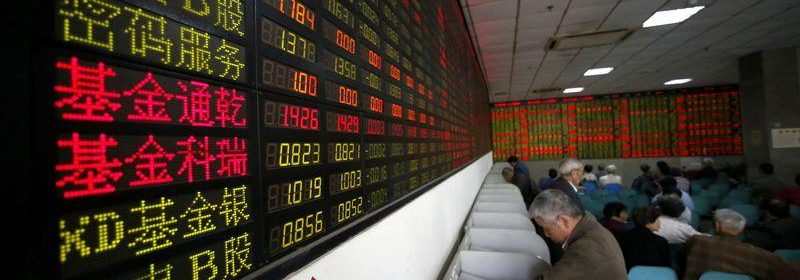Shares tap the brakes, bonds sense caution

LONDON (Reuters) – World shares tapped the brakes on Thursday as China troubles struck again, while Europe’s bond markets steadied after confident-sounding ECB policymakers had caused their sharpest selloff in six months.
The Federal Reserve’s annual Jackson Hole policy symposium on Friday made investors avoid major moves but there was plenty, including European Central Bank meeting minutes and U.S. GDP data and weekly unemployment claims, to keep the wait interesting.
Asia had also seen its first post-COVID outbreak interest rate rise in South Korea overnight. Chinese markets had fallen after the country’s most indebted property developer Evergrande warned of a major profit slump, Japan suspended Moderna’s COVID vaccine, while German data showed consumers’ mood there darkening again.
The pan-European STOXX 600 index was down 0.4% ahead of the Wall Street opening bell. Mining, travel and leisure and retail stocks were among the biggest losers. The S&P 500 and Nasdaq were expected later to tick down too after their 51st record high of the year.
That mild bout of risk aversion helped steady safe-haven government bonds after Wednesday’s wobbles, although yields – which move inverse to a bond’s price – were starting to creep up again.
ECB minutes showed policymakers had needed to redraft the wording of this month’s new forward guidance twice to appease the bank’s more hawkish members, and even then Germany and Belgium had still not been on board.
“The most interesting thing we got was the euro sovereign bond market coming alive yesterday,” Saxo Bank’s head of FX strategy John Hardy said, pointing to the sharp spike in yields that had also lifted the euro.
Hardy said the market seemed very complacent about Jackson Hole, so there was room for a surprise.
MSCI’s broadest index of Asia-Pacific shares outside Japan fell 0.65% overnight. Chinese blue chips lost 2% rattled by Evergrande’s profit warning, which had sent its shares down 7% and its electric vehicle unit tumbling nearly 20%.
Hong Kong had also shed 1% as a tech rebound ran out of steam and the Hang Seng Tech Index, where many of the big Chinese tech firms are listed, fell 1.9%.
Elsewhere, the Australian benchmark lost 0.5% as the country’s new daily coronavirus cases topped 1,000 for the first time. Japan’s Nikkei ended little changed after the government kept its economic forecasts broadly intact.
“The easiest piece to write in global economics right now is the COVID tortoises and hares,” said Societe Generale’s Kit Juckes.
“The zero COVID countries had a cracking start but now it is the others that are leading,” he said, pointing to how restaurant and airline bookings in Europe had been steadily improving whereas places like Australia were tough.
POLICY CHANGES
The global inflationary pulse was also in the headlines as the South Korean central bank lifted its base rate off a record low, the first major economy in Asia to do so.
Governor Lee Ju-yeol suggested the bank could further tighten policy as data showed Asia’s fourth-largest economy was overheating.
Central banks around the world are laying the groundwork for a transition away from crisis-era stimulus as what began as emergency support now overheats many economies.
Investors and policymakers are particularly focused on what Fed Chair Jeremy Powell signals at Jackson Hole on Friday.
“The Jackson Hole meeting could be the trigger for the Fed to consider tapering its bond purchases, though it is unlikely,” Sébastien Galy, senior macro strategist at Nordea Asset Management said. “The Delta variant is spreading and the overshoot in inflation has dampened consumer sentiment – a process that could last another month or so.”
Treasury yields had inched down in Asia but were rising again as U.S. trading began. The yield on benchmark 10-year Treasuries was last 1.36% compared with 1.33% in late Asian trading.
The dollar, which is up nearly 4% since late May, was edging up again too, 0.1% higher at 1.1757 per euro and buying 110.16 Japanese yen.
In commodity markets, oil prices fell after three days of gains, with Brent crude down 0.9% at $71.56 per barrel and U.S. crude dipped 1.2% to $67.5 a barrel. Gold and iron dipped 0.3% and 0.8% respectively in metals markets.
Source: Read Full Article
